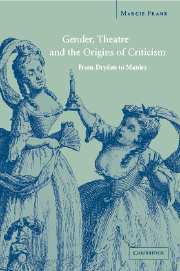Book contents
- Frontmatter
- Contents
- Acknowledgments
- Introduction. The critical stage
- 1 “Equal to ourselves”: John Dryden's national literary history
- 2 Staging criticism, staging Milton: John Dryden's The State of Innocence
- 3 Imitating Shakespeare: gender and criticism
- 4 The female playwright and the city lady
- 5 Scandals of a female nature
- Notes
- Bibliography
- Index
3 - Imitating Shakespeare: gender and criticism
Published online by Cambridge University Press: 22 September 2009
- Frontmatter
- Contents
- Acknowledgments
- Introduction. The critical stage
- 1 “Equal to ourselves”: John Dryden's national literary history
- 2 Staging criticism, staging Milton: John Dryden's The State of Innocence
- 3 Imitating Shakespeare: gender and criticism
- 4 The female playwright and the city lady
- 5 Scandals of a female nature
- Notes
- Bibliography
- Index
Summary
Declaring his love for Shakespeare in the Essay of Dramatick Poesy, Dryden praises him as England's Homer (xvii: 58); rewriting Antony and Cleopatra, he describes himself in the preface to All for Love (1678) as imitating the “Divine Shakespeare” (xiii: 18); and he not only lauds Shakespeare for his “Universal mind” in the “Grounds of Criticism in Tragedy,” the essay that prefaces his version of Troilus and Cressida (1679), but he also claims that it is by enquiring “how far we ought to imitate” Shakespeare that he will disclose the grounds of criticism that essay's title promises (xiii:229). Imitating Shakespeare offers Dryden the opportunity to articulate criticism as a vocation in the preface to All for Love; that preface is also the place where Dryden demonstrates a critical impartiality which underwrites his claims that criticism speaks to “all reasonable men” (xiii:11). The first is a feature, and the second, a mode of address paradigmatic of later criticism. Dryden's most longstanding critical production, Shakespeare's “Universal Mind,” allows him to cast the critical enterprise, derived from imitating Shakespeare, in philosophical terms.
Indeed, from Samuel Johnson to Gary Taylor, critics find in Dryden's extravagant appreciation of Shakespeare grounds for recognizing Dryden as an important critical predecessor. Johnson goes so far as to claim, in his Life of Dryden, that “[N]othing can be added” to Dryden's account of Shakespeare in the Essay of Dramatick Poesy by the subsequent critics whose practice he inaugurates.
- Type
- Chapter
- Information
- Gender, Theatre, and the Origins of CriticismFrom Dryden to Manley, pp. 64 - 90Publisher: Cambridge University PressPrint publication year: 2002



